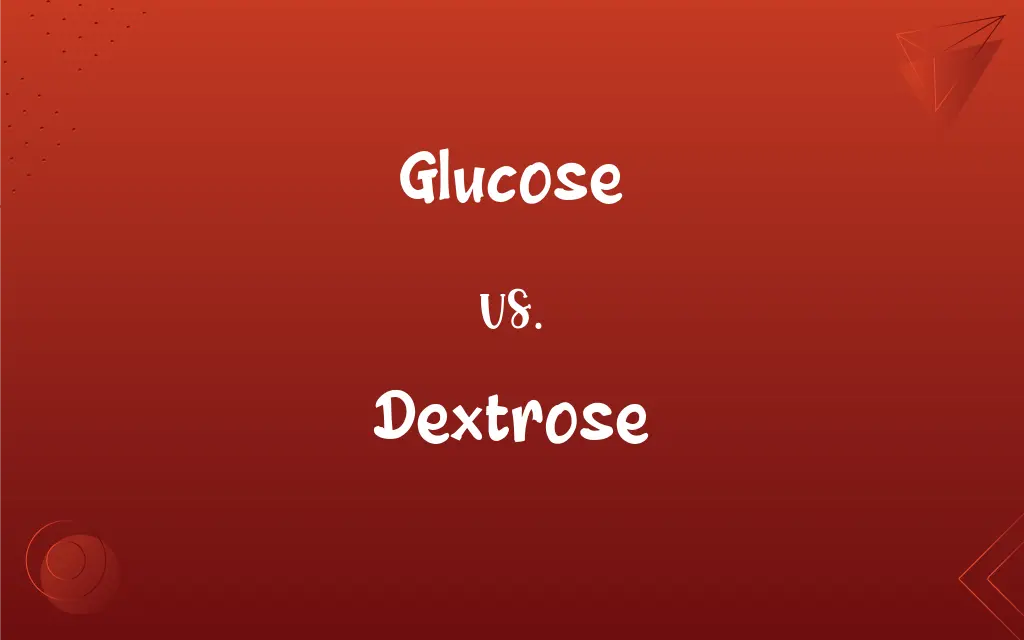Glucose vs. Dextrose: What's the Difference?
Edited by Janet White || By Harlon Moss || Updated on October 9, 2023
Glucose and dextrose are simple sugars, but glucose is a basic sugar unit while dextrose refers to D-glucose, found in plants and used in various foods.

Key Differences
Glucose represents a fundamental molecule in the carbohydrate family. It is a monosaccharide, existing as the primary unit that forms more complex carbohydrates like disaccharides and polysaccharides. Glucose serves as a crucial energy source for organisms, acting as a cellular fuel which is essential for numerous metabolic processes.
Dextrose, while commonly used interchangeably with glucose, specifically denotes D-glucose. The "D" refers to dextrorotatory, which means that it rotates plane-polarized light to the right. Dextrose is derived from starches, and it is heavily utilized in the food industry due to its sweetening and fermenting properties, where it also acts as a preservative in certain instances.
While both glucose and dextrose serve as energy sources, their applications, especially in the medical and food industries, can be distinct. Glucose is ubiquitously found in nature, and its applications span from being a metabolic substrate to a building block for complex carbohydrates. In medical contexts, glucose might be utilized in oral glucose tolerance tests or intravenous fluids for energy provision.
On the other hand, dextrose is a standard ingredient in baking and brewing, benefiting yeast fermentation processes and enhancing sweet flavors in food products. In the medical realm, IV solutions of dextrose can deliver rapid energy to patients, particularly those experiencing low blood sugar, thereby ensuring that cellular functions proceed adequately.
One might argue that glucose is the broader term, applicable to various forms of glucose molecules (like L-glucose and D-glucose), while dextrose is specifically oriented towards the D-glucose form, which is predominantly engaged in human metabolism and industrial applications. So, while glucose resides in a more general domain, dextrose pinpoints a particular stereochemical conformation of glucose, catering to both our biological and industrial uses.
ADVERTISEMENT
Comparison Chart
Definition
A monosaccharide, a simple sugar that occurs widely in most plants and in body fluids.
D-form of glucose, a naturally occurring form that is also derived from starch hydrolysis.
Rotatory Property
Can exist as D-glucose or L-glucose, each rotating light in opposite directions.
Always dextrorotatory, rotating plane-polarized light to the right.
Occurrence
Ubiquitous in fruits and vegetables naturally.
Obtained through the hydrolysis of starch and utilized industrially.
Medical Use
Used for various medical tests and sometimes in IV fluids.
Commonly used in IV solutions to treat low blood sugar and dehydration.
Industrial Use
Utilized in various forms in the food industry, but not as common as dextrose for sweetening.
Widely used for food sweetening and as a fermentation substrate in brewing.
ADVERTISEMENT
Glucose and Dextrose Definitions
Glucose
Glucose can be derived from the hydrolysis of more complex carbohydrates.
Breaking down starch during digestion releases glucose into the bloodstream.
Dextrose
Dextrose is the D-enantiomer of glucose, utilized in both biological and industrial applications.
The baker added dextrose to the recipe to enhance the sweetness of the bread.
Glucose
Glucose, a monosaccharide, serves as a fundamental building block for carbohydrates.
The doctor checked the patient's blood to measure the glucose levels.
Dextrose
Dextrose plays a pivotal role in the food industry, especially in baking and brewing, due to its fermenting capabilities.
Dextrose is often preferred in brewing to ensure effective yeast fermentation.
Glucose
Glucose molecules can link together to form disaccharides like maltose.
When two glucose molecules combine, they form maltose through a condensation reaction.
Dextrose
Dextrose can serve as a preservative, helping to extend the shelf life of certain food products.
The jam contained dextrose, which helped preserve its freshness and flavor over time.
Glucose
In biological contexts, glucose is pivotal for providing energy at the cellular level.
Glucose is crucial for cellular respiration, providing energy for cells.
Dextrose
In the realm of sport and fitness, dextrose is sometimes employed to rapidly restore glycogen levels.
After the intense workout, she consumed a dextrose drink to replenish her glycogen stores quickly.
Glucose
Glucose can exist in two optical isomer forms: D-glucose and L-glucose.
Most organisms primarily utilize D-glucose for metabolic processes.
Dextrose
In medical scenarios, dextrose is often used in intravenous solutions for quick energy.
The nurse administered a 5% dextrose solution to the patient to prevent hypoglycemia.
Dextrose
The dextrorotatory form of glucose, C6H12O6·H2O, the naturally occurring form of glucose found in all organisms. Also called dextroglucose.
Dextrose
The naturally-occurring dextrorotatory form of glucose monosaccharide molecule.
Dextrose
A sirupy, or white crystalline, variety of sugar, C6H12O6 (so called from turning the plane of polarization to the right), occurring in many ripe fruits, and also called glucose. Dextrose and levulose are obtained by the inversion of cane sugar or sucrose, and hence the mixture is called called invert sugar. Dextrose is chiefly obtained by the action of heat and acids on starch, and hence called also starch sugar. It is also formed from starchy food by the action of the amylolytic ferments of saliva and pancreatic juice.
Dextrose
An isomer of glucose that is found in honey and sweet fruits
FAQs
Can glucose and dextrose be used interchangeably in cooking?
Yes, they often can be, but it's essential to consider that dextrose is specifically D-glucose and might have slightly different properties.
Is dextrose the same as glucose?
Dextrose refers specifically to D-glucose, a form of glucose, but they are often used interchangeably in certain contexts.
Why is glucose important in the body?
Glucose is vital as a primary source of energy for cells and is crucial for various metabolic processes.
In what industry is dextrose predominantly used?
Dextrose is widely used in the food industry for its sweetening, fermenting, and preserving properties.
Are glucose and dextrose safe for diabetics?
In controlled amounts and under medical supervision, they can be used, but generally, their intake should be monitored due to their impact on blood sugar levels.
How is dextrose produced industrially?
Dextrose is typically produced by hydrolyzing starch, often from corn, using enzymes or acids.
Can you be allergic to glucose or dextrose?
Allergies specifically to glucose or dextrose are extremely rare but may be possible.
What is glucose?
Glucose is a simple sugar and a fundamental form of energy in living organisms.
Why is dextrose used in IV fluids?
Dextrose in IV fluids provides a rapid energy source, especially useful for patients experiencing low blood sugar.
Where can glucose be found in our diet?
Glucose is present in carbohydrates like fruits, vegetables, and grains and is released during digestion.
Is dextrose natural or synthetic?
Dextrose can be found naturally but, for industrial uses, it's often derived synthetically from starch hydrolysis.
Can glucose be harmful?
While glucose is necessary for life, excessive levels, especially sustained, can lead to metabolic disorders and other health issues.
Is there a difference in sweetness between glucose and dextrose?
Both glucose and dextrose are perceived as sweet, though they are less sweet than sucrose (table sugar), with little perceptible difference between them.
Can I replace dextrose with glucose in a recipe?
Generally, yes, but subtle differences in sweetness and texture might be observed.
Why is dextrose added to processed foods?
Dextrose is added to enhance flavor, aid in fermentation processes, and sometimes to preserve the food.
How does the body use dextrose?
The body rapidly absorbs dextrose, converting it into energy and storing excess as fat.
How is glucose produced in nature?
Glucose is produced through photosynthesis in plants and is found in various fruits and vegetables.
Why is glucose used in medical tests?
Glucose is used in tests like the oral glucose tolerance test to diagnose diabetes and assess how the body manages glucose processing.
How does the body regulate glucose levels?
The body utilizes hormones like insulin and glucagon to regulate blood glucose levels.
What are the health impacts of consuming glucose?
While glucose is vital for energy, excessive consumption can lead to health issues like obesity and type 2 diabetes.
About Author
Written by
Harlon MossHarlon is a seasoned quality moderator and accomplished content writer for Difference Wiki. An alumnus of the prestigious University of California, he earned his degree in Computer Science. Leveraging his academic background, Harlon brings a meticulous and informed perspective to his work, ensuring content accuracy and excellence.
Edited by
Janet WhiteJanet White has been an esteemed writer and blogger for Difference Wiki. Holding a Master's degree in Science and Medical Journalism from the prestigious Boston University, she has consistently demonstrated her expertise and passion for her field. When she's not immersed in her work, Janet relishes her time exercising, delving into a good book, and cherishing moments with friends and family.
































































